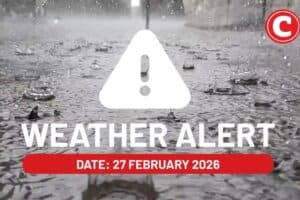Severe weather warnings and a new moon spring tide peaking on Saturday morning. Here's what to know to stay safe this weekend.

As several intense cold fronts sweep through the country, the National Sea Rescue Institute (NSRI) has issued a warning of this weekend’s peaking spring tide that strengthens rip currents and poses the threat of flooding.
The institute said bathers, boaters, paddlers, sailors, shoreline anglers and coastal hikers among others should be cautious around the coastline.
The new moon spring tide started peaking in the early hours of Saturday, with its effect set to last into the coming week.
New moon spring tide alert
NSRI spokesperson Craig Lambinon said the institute had its eye on other contributing factors as well.
“It is the final weekend of the school holidays and sea conditions are already naturally rougher than normal because of winter storms and cold fronts passing over parts of the coastline and deep sea off the SA shore, resulting in rips being stronger than normal around the coastline.
“The effect of the two daily tides being higher than normal and lower than normal will be strongest today [Saturday] and over the remainder of this weekend, gradually declining in intensity towards the middle and end of next week.”
Cold fronts and rough seas
Lambinon said people should be particularly aware of potential hazards during the outgoing tide and be mindful that cold fronts causing heavy rain and rough sea conditions are forecast for this weekend and into next week.
“We are appealing to the public to follow the South African Weather Service [SAWS] daily forecasts and around the coastline be aware of the daily tide time tables,” the NSRI spokesperson urged.
ALSO READ: Christmas in July on Table Mountain? Cold fronts to bring snow in four provinces
New moon spring tide safety tips
- Steer clear of coastal hiking trails that can be cut off during high tide.
- Anglers fishing along the shoreline are urged to keep a safe distance away from the shoreline.
- Beware of adverse weather, strong winds, fast-flowing rivers and sea currents and drifts.
- Do not drive through flooded roadways or cross bridges affected by flooding rivers.
Intense cold fronts bring damaging waves and winds
According to the SAWS, damaging winds and waves are expected along the south-east coast, with a Level 4 warning issued for the Eastern Cape coastline.
Severe weather warnings
The SAWS has issued several severe weather warnings for the weekend. These include:
- A Level 4 for heavy rain and potential flooding over the western parts of the Western Cape on Sunday.
- A Level 6 warning for high winds of between 80 and 90km/h over the western and south-western parts of the Western Cape on Sunday.
- A level 4 warning for winds of between 50 and 70km/h for the Namakwa district as well as the central and eastern parts of the Western Cape.
- A Level 6 warning for waves between 6 and 8m along the coastline between Alexander Bay and Cape Agulhas from Sunday, spreading to Plettenberg Bay by the afternoon.
- A Level 4 warning for disruptive snowfall over the mountains of the Western Cape as well as the southern high ground of the Namakwa District on Sunday.
NOW READ: Western Cape disaster centre prepares for intense cold fronts from Sunday until Tuesday
Support Local Journalism
Add The Citizen as a Preferred Source on Google and follow us on Google News to see more of our trusted reporting in Google News and Top Stories.






